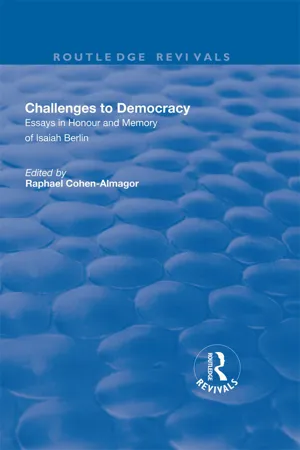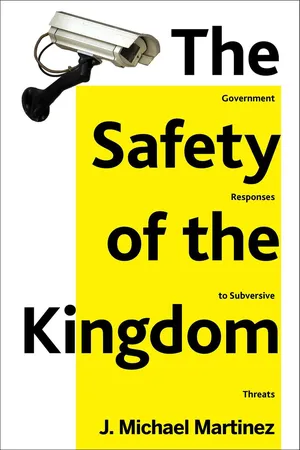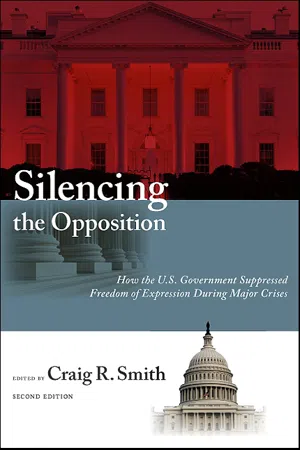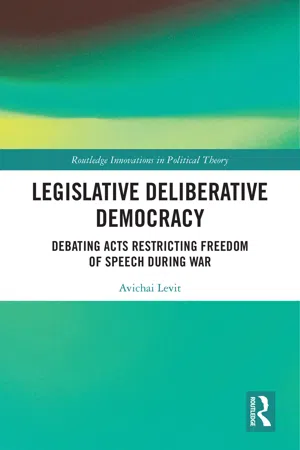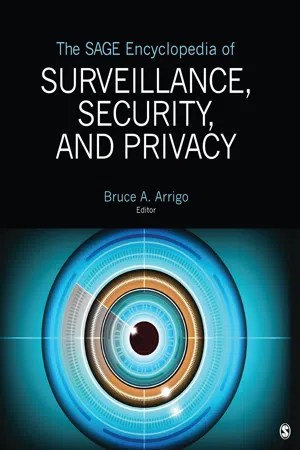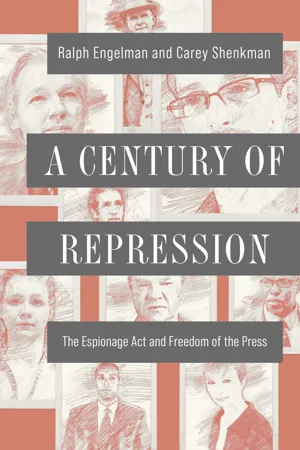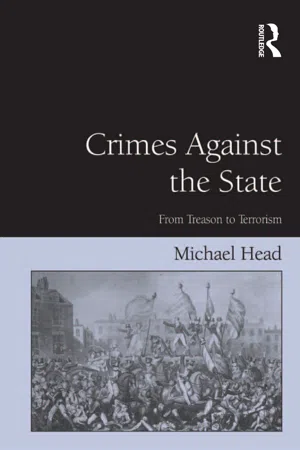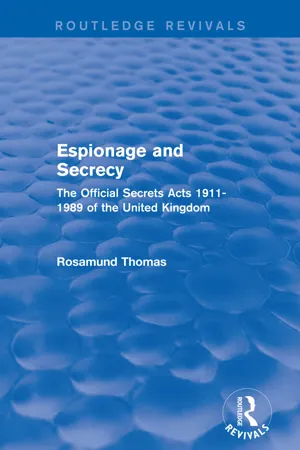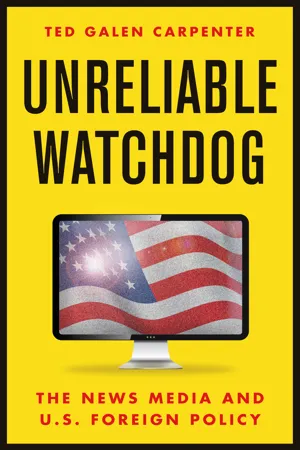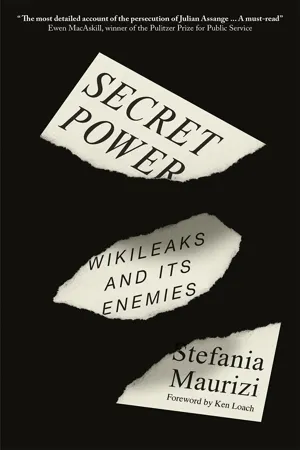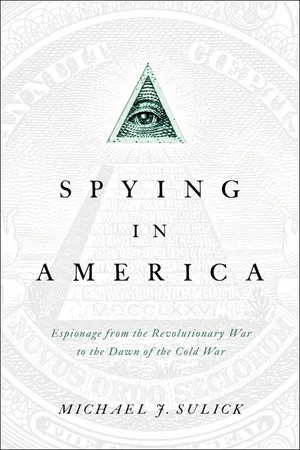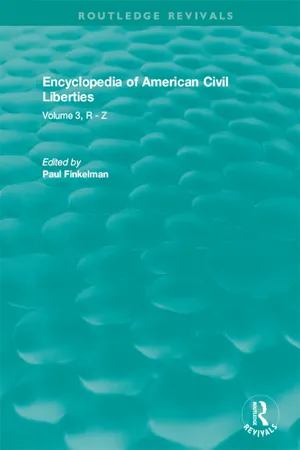History
Espionage Act of 1917
The Espionage Act of 1917 was a United States federal law that made it a crime to interfere with military operations or to support U.S. enemies during wartime. It also allowed the government to censor the mail and prosecute individuals for expressing dissenting opinions. The Act was controversial for its impact on free speech and civil liberties.
Written by Perlego with AI-assistance
Related key terms
12 Key excerpts on "Espionage Act of 1917"
- eBook - ePub
Challenges to Democracy
Essays in Honour and Memory of Isaiah Berlin
- Raphael Cohen-Almagor(Author)
- 2018(Publication Date)
- Routledge(Publisher)
The three basic laws used during the war to counter ‘disloyalty’ and promote patriotism were the Espionage Act, the Sedition Act and the Aliens Act. Close study of the language employed in those Acts does not reveal the extent of the dangers they presented to free expression and other constitutionally guaranteed rights. It was the way they were interpreted by district attorneys and the courts that made them such a threat to basic American freedoms.On 15 June 1917, only two months after the United States entered World War I, Congress passed the Espionage Act. The law was composed of seventeen laws that were prepared by the Justice Department, and declared that:Whoever, when the United States is at war, shall willfully make or convey false reports or false statements with intent to interfere with the operation or success of the military or naval forces of the United States or to promote the success of its enemies and whoever, when the United States is at war, shall willfully cause or attempt to cause insubordination, disloyalty, mutiny, or refusal of duty, in the military or naval forces of the United States, or shall willfully obstruct the recruiting or enlistment service of the United States, to the injury of the service or of the United States, shall be punished by a fine of not more than $10,000 or imprisonment for not more than twenty years, or both.23Over 100,000 people were convicted, according to this section of the law and its amendment (the Sedition Act of 1918), among them politicians, leaders of the Industrial Workers of the World (I.W.W.), Eugene Debs and others.24 The Espionage Act also allowed the government to prohibit the distribution in the mail of:Sec. 1: - eBook - ePub
The Safety of the Kingdom
Government Responses to Subversive Threats
- J. Michael Martinez(Author)
- 2015(Publication Date)
- Carrel Books(Publisher)
112 President Woodrow Wilson signed the Espionage Act of 1917 as well as the 1918 amendments. Courtesy of the Library of Congress.The act was an extraordinary measure. After the Sedition Act of 1798 expired in 1801, no federal law in the United States prohibited seditious expression or the dissemination and publication of information harmful to national defense until the Espionage Act won passage in 1917. For all of Abraham Lincoln’s allegedly tyrannical impulses, he never benefited from overarching legislation that curtailed freedom of expression during the Civil War. President Lincoln argued that his piecemeal actions to censor the press and suspend the writ of habeas corpus were justified by the exigencies of a rebellion. As commander in chief of the armed forces, he possessed immense authority to suppress an insurrection. He could act in ways that normally would be unconstitutional, but his power was not unchecked. After peace prevailed, a president’s power would diminish, and the normal constitutional checks and balances would be in force.113The Espionage Act was crafted to apply, at least in theory, during the war as well as after the cessation of hostilities. Designed to meet a national emergency, the statute was not limited by the nature or extent of the emergency. Unlike Lincoln’s use of extraordinary power under temporarily extraordinary circumstances, the Espionage Act would expand federal authority, specifically the authority of the president, to such an extent that suppression of dissent could become an ordinary duty of government. - eBook - ePub
Silencing the Opposition
How the U.S. Government Suppressed Freedom of Expression During Major Crises, Second Edition
- Craig R. Smith, Craig R. Smith(Authors)
- 2011(Publication Date)
- SUNY Press(Publisher)
Lusitania. Wilson soon claimed that German agents were subverting national will.Once war was declared, the Congress passed the Espionage Act of 1917 and strengthened it in 1918. It passed the Trading with the Enemy Act in 1918 along with the Sedition Act. Section 3 of the Espionage Act was an outright assault on the First Amendment. One could be arrested for “willfully” making “false reports or false statements with intent to interfere with the operation or success of the [U.S.] military.” One could be arrested for “willfully” causing “or attempting to cause, or incite, or attempt to incite, insubordination, disloyalty, mutiny, or refusal of duty, in the military or naval forces of the United States, or … willfully obstruct … the recruiting or enlistment service of the United States.” One could be arrested for uttering, printing, writing, or publishing “any disloyal, profane, scurrilous, or abusive language about the form of government of the United States, or the Constitution of the United States, or the uniform of the Army or Navy … in contempt, scorn, contumely or disrepute.” One could be arrested for displaying the “flag of any foreign enemy.” Fines of up to $10,000 could be imposed along with prison sentences of up to 20 years.7Eugene Debs, the union leader (see chapter 5 ) and Socialist candidate for president, would be incarcerated under these acts, and Justice Oliver Wendell Holmes would speak for the majority of the Supreme Court in condemning Debs antiwar rhetoric. After the war, Wilson refused to pardon him.8 - eBook - ePub
Legislative Deliberative Democracy
Debating Acts Restricting Freedom of Speech during War
- Avichai Levit(Author)
- 2020(Publication Date)
- Routledge(Publisher)
Civil Liberties in Wartime: Legislative Histories of the Espionage Act of 1917 and the Sedition Act of 1918 . Buffalo: William S. Hein & Co., 2007.Rabban, David. Free Speech in Its Forgotten Years . Cambridge: Cambridge University Press, 1997.Statutes at Large of the United States of America , Vol. 41. Washington: Government Printing Office, 1921.Stone, Geoffrey R. Perilous Times: Free Speech in Wartime from the Sedition Act of 1798 to the War on Terrorism - Bruce A. Arrigo(Author)
- 2016(Publication Date)
- SAGE Publications, Inc(Publisher)
Supporters of espionage, however, argue that the practice actually decreases the probability of international conflict by providing countries with a more complete picture of the intentions of their enemies. For example, Glenn Sulmasy and John Yoo argue that the information gathered through espionage allows a country to adjust its strategy accordingly so as to prevent conflict. For example, if a country gains information about an imminent attack on its territory, it can take deterrent action to prevent military conflict. Alternately, espionage may reveal that a perceived enemy actually has benign intentions; in this case, a government may decide to open up peace talks. Overall, Sulmasy and Yoo argue that espionage provides intelligence that helps mitigate the uncertainty inherent in the international political arena.Domestic Prohibitions Against Espionage
Although espionage is not clearly banned by international law, many countries have passed domestic laws criminalizing the behavior and outlining harsh punishments for captured spies. The United Kingdom was one of the first nations to formalize this prohibition into law, with the 1889 Official Secrets Act. The law has been amended multiple times, most recently in 1989. Specifically, the Official Secrets Act made it a crime for a U.K. citizen living anywhere in the world to obtain state secrets, transmit state secrets, or harbor an individual who is acting as an agent of a foreign power.The United States modeled its own anti-espionage law, the 1917 Espionage Act, on the U.K. law. President Woodrow Wilson signed the Espionage Act into law during World War I; the act updated existing law, making it a crime to provide intelligence to the enemy. The act was later broadened, making it a crime to disrupt the war effort by urging draft resistance or disseminating false information.Like the United States and the United Kingdom, Russia also maintains laws criminalizing espionage; during the Cold War, the Soviet Union meted out harsh punishments to officials who acted as double agents. Typically, captured double agents were executed and buried in unmarked graves.Domestic espionage laws have been the subject of much criticism, as governments often use these laws to punish political dissidents or silence whistle-blowers. Famously, during World War I, the United States used the Espionage Act to jail Eugene Debs, an outspoken socialist who opposed U.S. involvement in the conflict. The law was also used to prosecute Daniel Ellsberg, a defense analyst for the RAND Corporation. In 1969, Ellsberg gave members of the press classified information about U.S. strategy during the Vietnam War; Ellsberg hoped that the release of the information would promote a robust public debate about continued U.S. involvement in the conflict. More recently, some members of the U.S. Congress have argued that the act should be used to prosecute Edward Snowden; Snowden, an intelligence analyst, leaked information to the press about the National Security Administration’s surveillance of domestic phone calls.- eBook - ePub
A Century of Repression
The Espionage Act and Freedom of the Press
- Ralph Engelman, Carey Shenkman(Authors)
- 2022(Publication Date)
- University of Illinois Press(Publisher)
67Chafee has also been criticized—most prominently by law professor David A. Rabban—for obscuring the history of the “forgotten years” of free speech battles prior to the First World War. In the decades prior to WWI, free speech controversies revolved largely around the censorship of speeches, meetings, and demonstrations organized by the IWW and others in connection with labor struggles and the right of agitation. Theodore Schroeder’s Free Speech League led the civil liberties movement at the turn of the century; Clarence Darrow was an associate. Lawyers such as Gilbert Roe, who represented the Masses, and Harry Weinberger, lead attorney in the Abrams case, were committed to the causes of the defendants they represented. Rabban writes of the prewar civil libertarians—rooted in radical abolitionist, anarchist, socialist, and syndicalist movements—that “they had very different notions of ideal societies than did Skull-and-Bones and the Harvard Law Review.”68 As Laura Weinrib writes in the opening sentence in her book on The Taming of Free Speech, “Civil liberties once was radical.”69The elite circle associated with the New Republic that advanced a new civil liberties movement had a more conservative political foundation than their prewar counterparts. Holmes, in his Abrams dissent, had patronizingly referred to the “silly leaflet” protesting US intervention in Russia at the heart of the case.70 Chafee criticized the legal basis of Abrams while expressing the view that the defendants should be deported instead of imprisoned. He assured his conservative critics that he “had no sympathy with the political and economic doctrines of these prisoners” and that “There is little of the heroic about these defendants and much that is repellant.”71 - eBook - ePub
Crimes Against The State
From Treason to Terrorism
- Michael Head(Author)
- 2016(Publication Date)
- Routledge(Publisher)
New Alliance Party v. Federal Bureau of Investigations (858 F Supp (SD NY 1994)), issued a similar ruling to strike down a challenge to FBI surveillance activities (Stone 2004: 499, fn 311).Despite this record, Stone argues that the courts, including the Supreme Court, played a critical role in ensuring there was no wholesale effort to stifle dissent through criminal prosecutions during the Vietnam War, unlike 1798, 1861, 1917, 1941 and 1951. At the same time, he admits that throughout the Vietnam War era, the government relied much more than in the past on indirect and surreptitious means of quelling opposition. He also concedes that one reason for the lesser use of criminal prosecutions was the unpopularity of the war, which drove two presidents from office (Stone 2004: 499–500). In other words, it was the strength of the anti-government movement, rather than the law or the courts, that prevented greater resort to repressive prosecutions.Even so, in 1971 the Nixon administration invoked the Espionage Act of 1917 to attempt to stop the release of the Pentagon Papers. It filed an injunction alleging that by publishing an initial article disclosing previously secret contents of the leaked documents, the Washington Post had violated the Espionage Act by wilfully communicating information ‘it knew or had reason to believe … could be used to the injury of the United States … to persons not entitled to receive such information’ (Stone 2004: 507).The Pentagon Papers, which had been handed to the media by former Defense Department and Rand Corporation researcher, Daniel Ellsberg, contained a damning historical review of America’s involvement in Vietnam since 1945. The documents showed that successive US governments had repeatedly lied to the American people, carried out secret illegal operations in Vietnam, militarily intervened on blatantly false pretences and killed tens of thousands of Vietnamese civilians. The papers demonstrated that Washington had consistently violated international law and committed the most serious war crimes. A 47-volume study, commissioned in 1967 by Secretary of State Robert McNamara, documented, for example, that at the end of World War II, President Truman had rejected urgent appeals from Vietnamese leader Ho Chi Minh for US assistance; that while the 1954 Geneva peace conference was in session, the US was planning paramilitary operations against the North; that President Kennedy’s ‘advisers’ in Vietnam had participated directly in military operations; that the US government had knowingly publicised false South Vietnamese intelligence reports about the extent of Communist infiltration; that the Gulf of Tonkin resolution that officially justified US military intervention had falsely accused the North of attacking a US warship; and the US government had concealed from the American public the fact that extensive bombing of North Vietnam had done little to impair the North’s military capacity but had killed tens of thousands of civilians (Stone 2004: 500). - eBook - ePub
Espionage and Secrecy (Routledge Revivals)
The Official Secrets Acts 1911-1989 of the United Kingdom
- Rosamund Thomas(Author)
- 2016(Publication Date)
- Routledge(Publisher)
2 Espionage and related offences: More recent analyses of section 1 of the Official Secrets Act 1911 (as amended)DOI: 10.4324/9781315542515-2This chapter explores in greater depth the meaning of key terms associated with section 1 of the Official Secrets Act, 1911 (as amended), illustrating the meanings by reference to recent espionage and related offences. Then, in Chapter 3 further key terms are defined which apply to the Official Secrets Acts as a whole (not exclusively to section 1 of the 1911 Act, as amended). In Chapter 4 the role of the Attorney-General, and other Law Officers of the Crown, is elaborated and an explanation is given of how the consent of the Attorney-General to a prosecution under the Official Secrets Acts 1911–1989, a statutory requirement under this law, operates in practice especially in espionage cases.It is common practice when writing about the criminal law to explain first those sections which apply to a statute in its entirety rather than to start with any one particular section. However, espionage is the most serious crime covered by the Official Secrets Acts 1911–1989 and is the focus of this book. Therefore, we are reversing this usual practice and begin this chapter with the most important definitions, being those which relate to crimes of espionage and to section 1 of the 1911 Act, as amended.2.1 Definition of Espionage and Related Offences in Section 1
The definition of espionage - or the offences covered by section 1 - has been a point of issue. Because there was a crisis concerning German spies at the time of the enactment of the 1911 Act, arguments have been raised as to whether section 1 is limited to spying only. The marginal note to this section reads ‘Penalties for Spying’ which reinforces this interpretation. In fact, marginal notes are not supposed to represent the entire content of any provision, as the Attorney-General made clear in the House of Commons’ debate in 1920. He observed, in respect of another sidenote in the Amending Act of 1920, that ‘the marginal note is not part of a statute’.1 In 1962, his view about sidenotes was endorsed by the Law Lords in the case of Chandler and Others v. Director of Public Prosecutions. This case relates to a conspiracy to commit an act of sabotage rather than spying. Sabotage may be defined as an act of wanton or malicious damage or destruction, while spying is ‘the obtaining by surreptitious means of information in the possession of one State for the benefit of another’.2 To constitute an offence under section 1, either act would need to involve either a prohibited place or material intended to be of use to an enemy. In the Chandler case, certain members of the Committee of 1003 planned to enter a prohibited place under the Official Secrets Acts (being a Royal Air Force station at Wethersfield, Essex and belonging to H. Majesty) in order to stage a demonstration on 9 December 1961. They proposed, by non–violent action, to immobilize the aircraft at the station for some six hours to draw public attention to the facts of nuclear warfare and thereby hoped, in the long-term, to prevent a nuclear war. The six accused persons, including Terence Chandler, Patrick Pottle and Michael Randle, were found guilty on 20 February 1962 at the Central Criminal Court on two counts of conspiracy under section 1 (1). A few months later appeals against conviction by the defendants were dismissed by the Court of Appeal but leave to appeal to the House of Lords was allowed because of the constitutional importance of this case and particularly the need to construe properly the terms of section 1(1)4 of the Official Secrets Act 1911. The Law Lords ruled that this section was not limited to offences of spying, notwithstanding its marginal heading, but was intended to cover the saboteur as much as the spy.5 - eBook - ePub
Unreliable Watchdog
The News Media and U.S. Foreign Policy
- Ted Galen Carpenter(Author)
- 2022(Publication Date)
- Cato Institute(Publisher)
Schenk v. United States . The Court unanimously upheld the Espionage Act of 1917, and the law became a permanent menace to a free press.Two aspects of the Schenk decision were especially destructive. First, the ruling came down after the war ended; by then, any claimed national security justification based on supposedly extraordinary wartime needs had become moot. Second, the logic underlying the ruling was alarmingly vague and expansive. Speaking for the Court, Justice Oliver Wendell Holmes expressed the view that First Amendment freedoms must give way to the exigencies of national security “when a nation is at war.” Holmes argued that many views that might be printed or spoken in times of peace “are such a hindrance” to the war effort “that their utterance will not be endured so long as men fight, and no Court would regard them as protected by any constitutional right.”1He then gave an example that attained notoriety in both legal scholarship and popular culture: falsely shouting “fire” in a theater was not protected speech. But Schenk’s supposed offense was circulating pamphlets and giving speeches criticizing the new law that imposed military conscription. Equating such peaceful dissent with creating a sudden, needless panic was a ludicrous comparison, but the consequences of the Schenk decision have been far-reaching, long-lasting, and corrosive.2Moreover, those effects have not been limited to periods of declared war. Congress has issued no declaration of war against any adversary since December 1941. Yet, the overuse of the power to classify and conceal documents from public view, vindictive prosecutions of whistleblowers, and threats to do the same to journalists who collaborate with them have become ever present. The Espionage Act and its underlying logic still menace First Amendment rights more than a century later. Perhaps even worse, this mentality—which says the press is either a useful tool to promote U.S. foreign policy or a threat that must be neutralized—has been an ongoing feature of the government-media relationship since the United States seized the global leadership mantle after World War II. - eBook - ePub
Secret Power
WikiLeaks and Its Enemies
- Stefania Maurizi, Lesli Cavanaugh-Bardelli(Authors)
- 2022(Publication Date)
- Pluto Press(Publisher)
13It is a brutal law insofar as it makes no distinction between spies who pass secret documents to the enemy to harm their nation, and whistleblowers and journalists who reveal documents to the public to expose atrocities, war crimes, torture, extrajudicial killings. It puts them all on the same level. It does not provide for a public interest defense either. It does not allow a journalist or whistleblower to say “Yes, I broke the law, but I did so to bring out extremely troubling facts that the public in a democracy ought to know.” Deprived of the capacity to invoke the public interest, they have no other shield with which to defend themselves.One of the most infamous attempts to charge sources and whistleblowers under the Espionage Act was the indictment against Daniel Ellsberg for revealing the Pentagon Papers. The case collapsed, however, when gross government misconduct emerged. The illegal wiretapping of his telephone calls; President Richard Nixon’s “plumbers” sneaking into Ellsberg’s psychiatrist’s office in search of information to blackmail him into silence; CIA assets being ordered to “incapacitate Ellsberg, totally,” which in the language of covert operations meant killing him.14 All of these abuses of power led the judge to dismiss the case.Despite the repeated attempts to use it, in all of the twentieth century only one15 journalistic source was ever actually indicted and found guilty under the Espionage Act: Samuel Loring Morison, a U.S. intelligence analyst who gave classified files to Jane’s Defence Weekly , a military magazine. Loring Morison was handed a two-year prison sentence in 1985 and was pardoned by U.S. President Bill Clinton in 2001.It was Barack Obama who took the unfortunate path of normalizing use of the Espionage Act against whistleblowers and journalistic sources as if they were spies and traitors. After promising to create the most transparent government in history, his administration indicted more whistleblowers and sources than all U.S. presidents before him combined: eight in all. Thomas Drake, Shamai Leibowitz, Stephen Kim, Chelsea Manning, Donald Sachtleben, Jeffrey Sterling, John Kiriakou and finally Edward Snowden. - eBook - ePub
Spying in America
Espionage from the Revolutionary War to the Dawn of the Cold War
- Michael J. Sulick(Author)
- 2014(Publication Date)
- Georgetown University Press(Publisher)
President Wilson, however, still remained concerned about German spies and convinced Congress to pass the Espionage Act on June 15, 1917, the country’s first comprehensive law since the Continental Congress had established the death penalty for spying in 1776. However, Congress stopped short of resolving the turf war between the Secret Service and Bureau of Investigation. The law gave Justice authority to prosecute persons for violations of the Espionage Act but also authorized the president to use the Secret Service for national security investigations when a state of emergency was declared. Without precisely defined authorities, both agencies simply continued to hunt for spies.Some voices called for military control of counterespionage, but this idea was squelched because of America’s historical concern about military involvement in the domestic arena. The military, in fact, had already played a role in hunting spies. The army’s Military Intelligence Division (MID) also relied on the APL to assist in monitoring subversion and espionage around military bases. Although the army’s counterespionage role was restricted to military facilities and personnel, MID ventured beyond these limits into the civilian realm. In one case, MID recruited two African Americans to infiltrate ghettos to gauge the morale of the black population toward the war, an operation clearly beyond its military counterespionage charter.4 After World War I MID’s counterintelligence branch was disbanded because of criticism of its role in domestic spying and its collaboration with the vigilante APL.Attorney General Gregory strongly opposed military control of counterespionage and tried to allay the mass hysteria about foreign spies under every bed by claiming that German espionage in America had been eliminated. In a sarcastic note to a Justice Department colleague in April 1918, Gregory dismissed fears about widespread espionage: “There is quite a deal of hysteria in the country about German spies. If you will kindly box up and send me from one to a dozen I will pay you very handsomely for your trouble. We are looking for them constantly, but it is a little difficult to shoot them until they have been found.”5Gregory proved to be right. The departure of failed intelligence officers like Rintelen, Von Papen, Boy-Ed, and Albert ended any significant German espionage in America. No major German spy was discovered for the rest of the war. As the war wound down and Gregory’s assessment proved correct, the Secret Service’s legal authority in a “state of emergency” no longer held much force. The Justice Department’s Bureau of Investigation remained the only agency authorized and capable of pursuing spies. In spite of the turf wars, presidential neglect of the issue, and congressional reluctance to clarify jurisdictions, the responsibility for finding spies ultimately rested by default with the Department of Justice, the agency responsible for enforcement of the nation’s laws and safeguarding civil liberties. Yet ironically, in the first years after World War I, the department abused rather than safeguarded these liberties in its zealous pursuit of spies and saboteurs. - eBook - ePub
- Paul Finkelman(Author)
- 2018(Publication Date)
- Routledge(Publisher)
Schaeffer he entered the debate and helped refine clear and present danger so that it would serve more as a protection for free speech than as a license for government repression. He set forth the utility of free speech in a democratic society: Even though it could be abused, the benefits of untrammeled discourse far outweighed any inconvenience. Above all, basic rights should not be crippled because of wartime hysteria. An intolerant majority, he declared, “swayed by passion or fear, may be prone in the future, as it has often been in the past, to stamp as disloyal opinions with which it disagrees. Convictions such as these, besides abridging freedom of speech, threaten freedom of thought and of belief.”The last of the major Espionage Act cases came down soon after: Pierce v. United States (1920) involved prosecution of three Socialists for distributing a strongly antiwar pamphlet. Justice Mahlon Pitney quickly disposed of the constitutional arguments, merely citing the string of cases from Schenck through Schaeffer to sustain the conviction. But he then went to great length to disprove the allegations made in the pamphlet, especially that the war had economic causes. Such a false view, he claimed, could not help but have an adverse, even if indirect, effect on the successful prosecution of the war. (Interestingly, six months earlier Woodrow Wilson had stated: “Who does not know that the seed of war in the modern world is industrial and commercial rivalry. This was a commercial and industrial war.” By the Pierce opinion, the president could have been prosecuted under the Espionage Act!)Brandeis, again joined by Holmes, entered a long and thorough dissent, claiming the government had failed to prove that the publication had posed any danger to the war effort. To urge men to better their lot by creating new laws and institutions could not be labeled a criminal act “merely because the argument presented seems to those exercising judicial power to be unfair in its portrayal of existing evils, mistaken in its assumptions, unsound in reasoning, or intemperate in language.” The “falsity” of one’s view, according to the interpretation of free speech Brandeis and Holmes advocated, had nothing to do with one’s right to promote that view.
Index pages curate the most relevant extracts from our library of academic textbooks. They’ve been created using an in-house natural language model (NLM), each adding context and meaning to key research topics.
